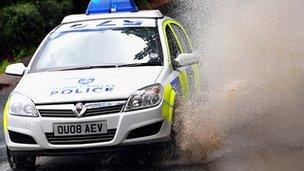Police and crime commissioner elections: Thames Valley
- Published

Thames Valley Police is the largest non-metropolitan force in England
On 15 November, 37 police and crime commissioners will be elected in England, along with four in Wales.
The PCCs, as they will be known, will be tasked with scrutinising their force and holding it to account. They will also be able to hire and dismiss the chief constable and set the force's budget.
The commissioners will be paid and are supposed to empower local people into having a say on how crime is tackled in their area.
Nominations for candidates in the Thames Valley have now officially closed.
BBC News has taken a look at each of the police forces ahead of the elections.
Thames Valley Police
Thames Valley Police (TVP) is the largest non-metropolitan force in England.
It covers Oxfordshire, Berkshire and Buckinghamshire. The three counties are divided into 15 Local Police Areas (LPAs) and led by a commander who is responsible for performance and service at a local level.
The force serves a population of almost 2.3 million.
One of the main priorities for TVP is reducing incidents of serious violence.
In 2010/11, violence against a person fell by more than 3,000 offences across the area.
The force credits this reduction partly to its focus on early intervention, where officers deal with public order offences before they can escalate into something more serious. As a result there has been an increase in the number of public order offences.
Thames Valley Police also names tackling anti-social behaviour as a priority. It works with local authorities and agencies as part of a Community Safety Partnership (CSP).
According to TVP, anti-social behaviour incidents were reduced by 19% in 2010/11 compared with the year before.
Funding
The budget for Thames Valley Police in 2012/2013 is £371m, compared to £383m the previous financial year.
In 2013/2014 the force is looking for a budget of £380.366m, depending on whether there will be a 2% increase in council tax.
The overall reduction in government funding for the Thames Valley in the period covering the financial years 2010/2011 to 2014/2015 is £31.7m, or 11.5%.
This financial year the force is looking to save 17.8m, which will include staff cuts. In 2013/2014 the force aims to save £11.6m.
But the force said its "productivity strategy has ensured that there will be no cuts in the number of officers on patrol or in neighbourhood policing teams".
Crime and performance
According to police figures, crime in general fell by 7% during 2010/11, or 12,900 fewer victims of crime compared with the year before.
The force also reported "significant reductions in the number of burglary, robbery, vehicle crime, violence and serious sexual offences".
In 2010/11 there were 5,400 fewer of these offences and the number of offenders being charged with these offences increased.
For example, reports of serious sexual offences reduced from 1,618 in 2009/2010 to 1,528 in 2010/2011 - a 5.6% fall.
TVP's detection rate (which covers charges, cautions, penalty notices) for serious sexual offences increased from 377 to 417 in the same period, achieving the force's 27% target.
TVP said Project Morse was launched in 2010 to try to increase the amount of offenders being charged with serious crimes. The project looked at each part of the investigation process from looking for more forensic opportunities to how offenders are interviewed in custody.